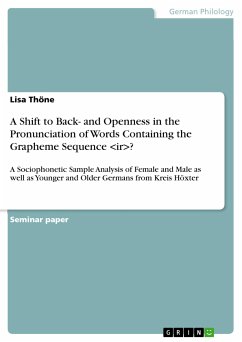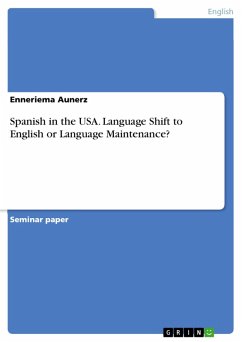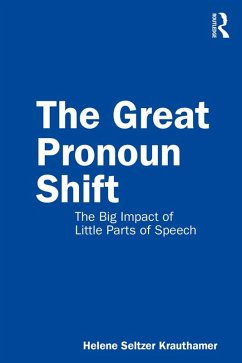
A Shift to Back- and Openness in the Pronunciation of Words Containing the Grapheme Sequence ? (eBook, PDF)
A Sociophonetic Sample Analysis of Female and Male as well as Younger and Older Germans from Kreis Höxter
Sofort per Download lieferbar
Statt: 11,95 €**
6,99 €
inkl. MwSt. und vom Verlag festgesetzt.
**Preis der gedruckten Ausgabe (Broschiertes Buch)
Weitere Ausgaben:

PAYBACK Punkte
0 °P sammeln!
Seminar paper from the year 2022 in the subject German Studies - Linguistics, grade: 1,3, University of Paderborn (Institut für Anglistik und Amerikanistik), course: Sociophonetics, language: English, abstract: This paper fills a gap in sociophonetic research by examining the pronunciation of in Kreis Höxter, Germany. The paper investigates whether speakers demonstrate a shift to more back and open sounds. As sociolinguistics as a systematic research field developed no longer than in the mid twentieth century, many sociolinguistic phenomena remain unexplained yet or are not studied to a wid...
Seminar paper from the year 2022 in the subject German Studies - Linguistics, grade: 1,3, University of Paderborn (Institut für Anglistik und Amerikanistik), course: Sociophonetics, language: English, abstract: This paper fills a gap in sociophonetic research by examining the pronunciation of in Kreis Höxter, Germany. The paper investigates whether speakers demonstrate a shift to more back and open sounds. As sociolinguistics as a systematic research field developed no longer than in the mid twentieth century, many sociolinguistic phenomena remain unexplained yet or are not studied to a wide extent. This is also the case for the sociophonetic research topic of this paper. It is generally known, although not systematically proven, that in Northern Germany, many speakers articulate more back and open sounds compared to Standard German when they pronounce words containing the grapheme sequence . This could be exemplified by the word , which a North-German speaker who inspired this project pronounced with /¿/, where the tongue is positioned more back than with /¿/. Sometimes, one can also hear an /ø/, where the mouth is more open than with /¿/. This applies to younger female speakers who are vocally trained. Likewise, the 37-year-old male speaker from Northern Germany is very well vocally trained as a singer and audiobook/radio play speaker.
Dieser Download kann aus rechtlichen Gründen nur mit Rechnungsadresse in A, B, BG, CY, CZ, D, DK, EW, E, FIN, F, GR, HR, H, IRL, I, LT, L, LR, M, NL, PL, P, R, S, SLO, SK ausgeliefert werden.













